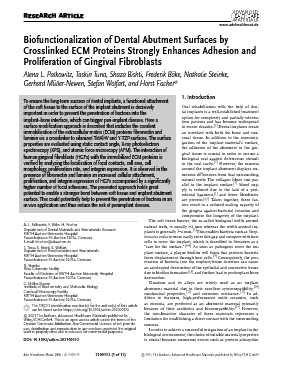05.11.2021
Biofunctionalization of Dental Abutment Surfaces by Crosslinked ECM Proteins Strongly Enhances Adhesion and Proliferation of Gingival Fibroblasts
Advanced Healthcare Material, 2021
Abstract
To ensure the long-term success of dental implants, a functional attachment of the soft tissue to the surface of the implant abutment is decisively important in order to prevent the penetration of bacteria into the implant-bone interface, which can trigger peri-implant disease. Here a surface modification approach is described that includes the covalent immobilization of the extracellular matrix (ECM) proteins fibronectin and laminin via a crosslinker to silanized Ti6Al4V and Y-TZP surfaces. The surface properties are evaluated using static contact angle, X-ray photoelectron spectroscopy (XPS), and atomic force microscopy (AFM). The interaction of human gingival fibroblasts (HGFs) with the immobilized ECM proteins is verified by analyzing the localization of focal contacts, cell area, cell morphology, proliferation rate, and integrin expression. It is observed in the presence of fibronectin and laminin an increased cellular attachment, proliferation, and integrin expression of HGFs accompanied by a significantly higher number of focal adhesions. The presented approach holds great potential to enable a stronger bond between soft tissue and implant abutment surface. This could potentially help to prevent the penetration of bacteria in an in vivo application and thus reduce the risk of periimplant disease.
Dianova´s Anti-Fibroblasts Marker CD90 DIA-100 is featured in this study.


